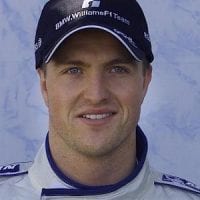Ralf Schumacher was a grand prix winner and could have won the 2003 World Championship but history does not remember his racing career well. Maybe it was a backlash against Michael’s success; perhaps fans were rankled by another Schumacher’s self-belief without the justification of 91 race wins; or it could have been his grumpy persona.
After his F1 career fizzled out with Toyota, Schumacher raced touring cars in DTM, had a spell in team management and joined Sky Sports Germany as an F1 pundit. His personal life brought renewed attention when he revealed in 2024 that he was in a same-sex relationship; one of very few LGBTQ+ F1 figures.
Early racing career
Inevitably his career was forever in the shadow of his older brother. Six years younger, Ralf Schumacher drove at the local kart track from the age of three and he made the switch to cars just as Michael was arriving in Formula 1. The younger sibling was runner-up in the 1993 German Formula BMW Championship in his first season out of karts and he graduated to Formula 3 with WTS Racing.
Runner-up behind Norberto Fontana in the 1995 German F3 Championship, he finished second at Monaco and ended his second year in the category with victory in the all-important Macau GP. He remained in the Far East for the following season and enjoyed his best campaign to date by winning the 1996 Japanese Formula Nippon title with a Team Le Mans Reynard 96D-Mugen.
Formula 1 with Jordan
That success led to his F1 opportunity. Eddie Jordan looked to youth for his 1997 line-up and signed Schumacher and the inexperienced Giancarlo Fisichella. The new team-mates collided during the Argentine GP but Schumacher was able to resume and finish in third position – at the time the youngest driver in history to finish on the podium in what was just his third GP.
However, two seasons with the team were largely disappointing apart from the 1998 Belgian GP. Heavy rain and accidents left the Jordan 198-Mugens of Damon Hill and Ralf Schumacher running first and second during the closing stages. Schumacher was closing on his team-mate before, to his obvious frustration, he was ordered not to overtake to ensure a breakthrough 1-2 for the team.
Grand Prix winner with Williams
Schumacher joined Williams in 1999 and raced for the British team for six seasons. The Williams FW21-Supertec was not a fully competitive package but his reputation was on the rise thanks to three podium finishes (including second at Monza) and sixth in the world championship.
Much was expected of the German and the new Williams FW22-BMW in 2000 and he was fifth in the standings. However, it had been a frustrating season in truth during which he was outpaced too often by inexperienced team-mate Jenson Button. Despite that, Button moved on to make way for another much-hyped newcomer in 2001 – Champ Car star Juan Pablo Montoya. When things went well, Schumacher was outstanding and he scored his breakthrough victory in the 2001 San Marino GP at Imola. Further success in Canada and Germany helped Schumacher to finish fourth in the final points.
With the most powerful engine in the business, a championship charge was expected in 2002 or 2003. He won races but that challenge never materialised and questions of whether he was able to sustain a season-long campaign seemed valid. Williams-BMW finished as runners-up in the Constructors’ Championship both of those years but that only emphasised an opportunity lost. Fourth in 2002 (a season that began with a spectacular aerial accident after hitting Rubens Barrichello’s Ferrari at the start in Australia) and fifth in 2003 represented a disappointing championship return.
His 2004 campaign was interrupted by a violent 180mph accident on the banking at Indianapolis after his tyre punctured. He sustained back injuries that forced him to miss six races in what proved to be his last season with Williams.
Frustration with Toyota
Schumacher accepted a lucrative but ultimately frustrating move to Toyota instead. He suffered another high-speed puncture and resulting crash while practising for the 2005 United States GP. However, he was sixth in the championship after challenging for the lead in Belgium, finishing third in Hungary and China and qualifying on pole position in Japan.
But the next two seasons with the Japanese team were largely unimpressive with another third in the 2006 Australian GP his only other visit to the podium. He left F1 at the end of a dispiriting 2007 campaign in which he only finished 16th in the championship.
Post F1
He tested for Force India that winter but instead joined AMG Mercedes for the 2008 DTM Championship. Four seasons in the competitive touring car series yielded a best finish of second at Spielberg in 2011. He led at the Norisring a year later but lost a possible breakthrough victory to an electrical problem.
Mercedes named Schumacher as one of its drivers for 2013, but he pulled out before the start of the season and took up a managerial post at Mücke Motorsport, where his role included coaching the Mercedes team’s rookie drivers.
In 2019, he joined Sky Sports Germany, working as an F1 pundit, and was still there when, in 2024, he revealed that he was in a same-sex relationship. The announcement, in an Instagram post, was quickly followed by a message of support from his son, David, a DTM driver, from his marriage to Cora-Caroline Brinkmann, which ended in divorce in 2015. “I’m very happy you’ve finally found someone with whom you feel comfortable,” David wrote.


